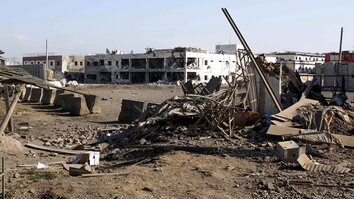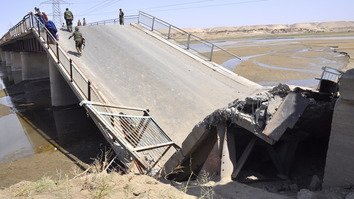KABUL -- The past few days of spiraling violence have exposed a clear tactic employed by Taliban leaders: use the group's continuing murder of Afghan civilians as a means to put pressure on the Afghan government and its international allies at the peace talks negotiating table.
The Taliban and the United States are close to striking a deal that would pave the way for intra-Afghan peace negotiations between the Taliban and the Afghan government, yet the Taliban have ramped up their attacks on civilians and are using their deaths as a bargaining chip.
A massive blast Monday (September 2) in a residential area of Kabul killed at least 16 and wounded 119 others, all civilians, according to the Interior Ministry.
The Taliban claimed responsibility in a statement.
![Wounded men lie in bed September 3 after being treated at Wazir Akbar Khan hospital after a massive explosion the night before in Kabul. [Wakil Kohsar/AFP]](/cnmi_st/images/2019/09/03/19725-000_1jz16o-585_329.jpg)
Wounded men lie in bed September 3 after being treated at Wazir Akbar Khan hospital after a massive explosion the night before in Kabul. [Wakil Kohsar/AFP]
![Image posted on social media shows the aftermath of a Taliban car bomb that exploded in Kabul on September 3. [File]](/cnmi_st/images/2019/09/03/19728-carbomb-585_329.jpg)
Image posted on social media shows the aftermath of a Taliban car bomb that exploded in Kabul on September 3. [File]
![Acting Interior Minister Masood Andarabi chats with an Afghan soldier in Kunduz city August 31. Hours after the Taliban attacked the provincial capital, Afghan senior security officials arrived to monitor the situation closely. [Nasrat Rahimi/Twitter]](/cnmi_st/images/2019/09/03/19724-eduzdkmucaevata-585_329.jpg)
Acting Interior Minister Masood Andarabi chats with an Afghan soldier in Kunduz city August 31. Hours after the Taliban attacked the provincial capital, Afghan senior security officials arrived to monitor the situation closely. [Nasrat Rahimi/Twitter]
The blast originated with a tractor packed with explosives that someone parked outside the Green Village, a large fortified compound that houses aid agencies and international organisations, said Interior Ministry spokesman Nasrat Rahimi.
Five gunmen then tried to storm the area in a "complex attack", but Afghan security forces killed them before they got far into the compound, Rahimi said.
"All our rooms have been destroyed, and I don't know where to go now. My two daughters have been injured and are in the hospital," said one woman wounded in the blast quoted by AFP.
"This explosion ruined our lives. It's not the first time, or the second time; it is the third time it has happened."
Meanwhile, the militants Saturday (August 31) also attempted to seize Kunduz city, Kunduz Province. The day after, they launched an operation in Pul-i-Khumri, the capital of neighbouring Baghlan Province.
Afghan forces thwarted both assaults within hours, killing dozens of Taliban militants. Kunduz city, which briefly fell into the hands of the Taliban in 2015, was back to normal Monday (September 2), according to Afghan officials.
"All of the Taliban attacks that were launched to win at the negotiating table encountered total defeat by the Afghan National Defence and Security Forces [ANDSF]," said Fawad Aman, deputy spokesperson for the Defence Ministry.
"The Taliban used all of their resources to capture the capitals of Kunduz and Baghlan provinces, but they returned to their hideouts after suffering heavy casualties," Aman said.
At least 51 Taliban militants were killed or wounded in Baghlan Province, according to Aman.
"The situation in Kunduz city and Pul-i-Khumri and their suburbs has returned to normal, with security forces present," he said. "No threat exists to residents in the areas."
"The Taliban in Farah Province also tried to attack the provincial capital," said Aman. "Their plan failed, and Afghans now understand that the Taliban are lying and unable to take over provinces. They only create terror and kill civilians in order to gain leverage in the negotiations."
Civilians as a bargaining chip
Other officials and analysts also said the Taliban's recent attacks are aimed at ensuring victory in talks with the United States and then with the Afghan government.
US special envoy Zalmay Khalilzad was in the Afghan capital to discuss the proposed deal when the Monday bombing happened.
"The militants want to increase their attacks and kill civilians to pressure the international community and the Afghan government in the talks," said Ghulam Rabbani Rabbani, a member of the Kunduz Provincial Council.
More than seven civilians were killed and at least 70 others were wounded with the Taliban attacked Kunduz city, he added.
"The Taliban did not have any achievements in assaulting Kunduz city. The only achievement they had was killing women and children and setting vehicles and shops on fire," Rabbani said.
"By killing civilians and creating terror, the Taliban wanted to show the world that they have the ability to take over provinces and cities, but they failed," said Aminullah Shariq, a Kabul-based political analyst.
"Almost all victims of the Taliban in Kunduz, Baghlan, Takhar, Balkh and other parts of the country were civilians. The militants' chosen strategy for winning concessions in the negotiations is inhumane, un-Islamic and a crime," Shariq said.
"The Taliban wanted to show the Afghan government and Americans that the group has the ability to challenge Afghanistan's security," said Kabul military analyst Aziz Stanakzai.
"But their plans had the opposite results because they couldn't take over Kunduz city or Pul-i-Khumri; therefore, they're in a worse position than before."
Taliban under pressure
"The back-to-back failures of the Taliban in various areas, especially in Kunduz, Baghlan and Badakhshan provinces, have severely undermined the group's military capability and weakened Taliban leaders' position in peace talks," said Moqadam Amin, a Kabul-based political analyst.
"The Taliban are under great pressure," said Aman, the Defense Ministry spokesman.
"We have launched large-scale operations in Badakhshan, Takhar, Balkh and Farah provinces. As a result, we have killed hundreds of Taliban militants, including their key commanders, and destroyed their hideouts, especially in Badakhshan."
In Badakhshan Province alone, ANDSF killed at least 150 Taliban militants in the past 10 days in Keran Wa Manjan, Jurm, Baharak, Warduj, Arghanjkhwa, Argo and Yamgan districts, according to Aman.
"On August 29, the Taliban launched a massive offensive on Chah Aab District in Takhar Province to take control of the centre of the district, but Afghan forces repelled the attack in time," Aman added. "Hekmat, a Taliban Red Unit commander, was killed along with 28 other militants, and the rest of them were forced to flee to remote areas and neighbouring villages."
"Taliban have lost. Pointing bombs & guns at civilians isn't a sign of strength at all," said former National Directorate of Security (NDS) chief Amrullah Saleh on Twitter.
"The US deal is a breathing space & if this fails they will get buried," said Saleh.








How can we subscribe your news
Reply2 Comment
In fact, Taliban do not exist. All these are works of Pakistani intelligence which want to kill Afghans and destroy Afghanistan. In the past, they were trained only by Pakistani army and intelligence while now Iranian intelligence also has joined it. May God destroy both of them.
Reply2 Comment